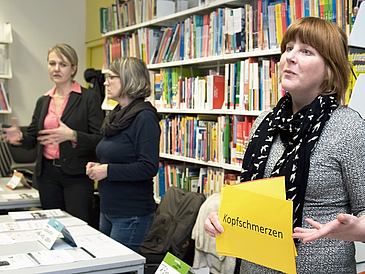Since the numbers of refugees living emergency accommodation in Bremen has been constantly on the rise, there has been no shortage of students and other volunteers willing to sacrifice their time to do what they can to ease their situation. Many of these helpers offer German language courses. However, this is no easy task for someone who hasn’t been trained as a teacher of German as a second language [Deutsch als Fremdsprache]. “They often lack the didactical and methodological skill-sets required for effective language teaching”, says Professor Nicole Marx. To remedy this state of affairs, this winter semester she is offering a compact seminar designed especially for refugee helpers.
The application-driven seminar called “German as a Second Language for Refugees” is offered as a course in the area of General Studies. Word soon got around, and the special training is attracting a lot of interest. The sixteen participants comprise students as well as working members of the general public. Professor Marx has developed what she calls a “paternoster language course for the transition period”. As the description implies, the idea is to be as flexible as possible and allow both instructors and participants to attend when it suits them best, something like a paternoster lift. “There is a considerable ebb and flow in the learning groups”, says the linguist. “We have to take that into account”. Both the participants as well as the instructors are of heterogeneous composition. They possess different language levels and knowledge of didactics, the group sizes differ greatly and, depending on the accommodation site, the facilities also vary. Some of the rooms used for classes are without any kind of technical facilities and learning materials, or in some cases even electricity.
Topics taken from the everyday lives of the refugees
The topics dealt with in these paternoster language courses are deliberately restricted to the six thematic areas considered to be the most important in the refugees’ everyday lives. The first topic comprises “persons, countries of origin, languages”. In this context, the participants introduce themselves to each other and break the ice: Important addresses and how to get there, shopping, time, home, living and the body are the other five themes. “The curriculum is designed along the lines of a spiral staircase, each storey of which contains three different learning levels”, says the language expert. The “paternoster themes” follow in strict sequence, and participants can step in or out at any time. The whole course targets beginners at the level A1. At this stage, vocabulary occupies the main focus. For beginners, functionality is all important: With this in mind, the language is taught in so-called chunks – word groups for which knowledge of grammar is less important. Examples for this are expressions like: “How are you?” or: “I come from …” According to Nicole Marx: “At this stage, the learners don’t have to know the difference between dative or accusative forms to make themselves understood”. Similarly, vocabulary is learned without the frills. “Head, stomach, arm, leg, and foot”, says the expert. “Ankle and eyebrows are initially unimportant”.
“… important that a conversation starts up”
This describes the approach adopted by Kathrin Seibert, who during a presentation of interim results of the compact seminar held in building GW2 demonstrates some of the materials she found the most helpful for teaching the topic “Body and Health”. Since summer, the student assistant who works in the Institute for Public Health and Nursing Research has been acting as a language trainer on a regular basis in the tent near building NW1. First she makes sure the participants are able to name parts of their body before moving on to expressions like “I don’t feel well”. In a subsequent learning unit they learn how to describe pains and body complaints in a more precise manner. “Here, I use pantomime and let the participants guess what I mean.” The aim of this class is that they are able to describe their physical complaints, read surgery opening times, make appointments, and maybe even have a telephone conversation with a doctor’s receptionist. “I think it’s very important that a conversation starts up”, says Kathrin Seibert. She works with games and pictures, and takes sticking plaster and bandages to class with as visual aids.
Games for language learning
Galina Gaspert comes all the way from Stuhr to attend the seminar. She was born in Kazakhstan, and here she works full time for Aldi as Assistant to the Management Board. Helping others comes naturally to her. When she goes to the accommodation tent for classes, her daughter accompanies her and offers help to families or joins in the language training. “These people have to feel they are welcome here; otherwise they might become aggressive or depressed”, she says. Galina Gaspert has prepared classes for “Home and living”. She teaches expressions by playing games with memory cards, for instance.
Participant from Achim full of praise
The compact seminar offered by Faculty 10 is such a huge success because it focuses on training the skill-sets the volunteer helpers really need for their work with refugees. “We now want to start language courses in our welcome café”, says Manuela Wölker, a lecturer in the field of adult education in the nearby town of Achim. “To do this we first need some down-to-earth information on didactics. That’s what the seminar at the University of Bremen gives us”.

